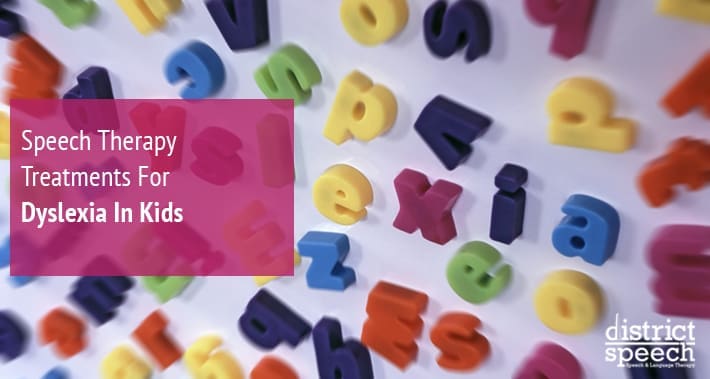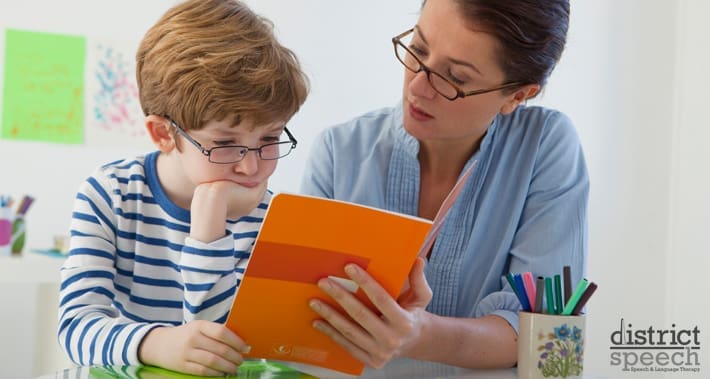
Learning to read and write is a big step for children towards learning independently and communicating effectively.
Starting school and the new reading expectations that come along with it can be a difficult adjustment for your child.
However, if there are ongoing issues with reading, writing, and word comprehension, there may be an underlying issue at play.
If your child is struggling with reading and writing specifically, speech therapy for dyslexia may be a helpful avenue to pursue.
If your child is struggling with communication but doesn’t have dyslexia, we can also help with speech therapy for children, regardless of what they’re struggling with.
In this article we’re going to talk a little bit about what dyslexia is, symptoms to watch out for, and how a speech therapist can help your child learn if they have it.
Let’s get to it.
What Is Dyslexia?
Dyslexia is commonly shown in the media as being a difficulty reading printed words.
There is some truth to that representation, but it’s far from the whole story.
The reading difficulties stem from issues identifying speech sounds and relating them to printed characters.
This specific process is known as decoding.
It may also present as a difficulty comprehending written text once they do read it.
This is especially true if your child’s comprehension improves dramatically when someone reads the same text aloud.
Dyslexia affects the areas of the brain responsible for language and has no link to visual impairment or intelligence.
There is no cure for dyslexia, but with appropriate strategies in place children with dyslexia can still learn and thrive in classroom environments.
RELATED: Dispelling The Myths Around Dyslexia
What Causes Dyslexia?
Right now, we don’t know all the causes of dyslexia.
However, there are some risk factors that might increase the chances that your child becomes dyslexic.
Genetics is one of the most likely factors influencing whether a child will have dyslexia or not.
This is because there are certain genes thought to be linked to the brain’s language processing abilities.
If you have a family history of dyslexia or other learning disabilities, that will likely affect how your child’s own abilities develop.
Birth and pregnancy circumstances can also be potential factors.
Exposure to drugs, alcohol, or infection during gestation as well as premature birth can increase your child’s likelihood of developing dyslexia.
Some autistic people are also dyslexic, but it’s no more common than the general public.
However, about 30% of people with ADHD are also dyslexic, but dyslexia doesn’t cause ADHD.
Even if none of these risk factors are at play, individual differences in brain development can also lead to dyslexia.
How To Tell If Your Child Has Dyslexia
Because there is no cure for dyslexia, it’s especially important to recognize signs early.
Early intervention speech therapy will help reduce the difficulty your child faces in the future.
Dyslexia In Preschool Age Children
Before your child starts school, it can be harder to notice the unique challenges that they may be facing with dyslexia.
However, there are early signs that can be helpful to look for.
Because dyslexia impacts the part of the brain responsible for processing language, it can lead to difficulty learning new words or forming words properly.
You might notice this even before your child starts learning to read, in their spoken vocabulary.
Before your child learns to read, you might notice they have difficulty with remembering the names of shapes, numbers, or colors.
They also may have difficulty learning or understanding rhymes in nursery rhymes or rhyming games.
Dyslexia In School Age Children
When your child starts school, their dyslexia symptoms may become much more obvious.
This is mostly because reading becomes part of the day to day expectations of school.
If your child has dyslexia, you may notice that they learn to read more slowly than their peers.
They may also be behind their grade level in learning to read.
This can appear as difficulty processing written passages, extended time to complete reading and writing tasks, difficulty spelling, or inability to sound out new words.
All of these factors combined may lead to avoidance of reading and writing tasks, making that an additional sign to watch out for.
You may also notice some signs of dyslexia that show up in non reading ways in your school age child.
Issues processing or understanding spoken speech, seeing or hearing similarities and differences between words or sounds, and finding the right words and orders to answer questions aloud may also be signs of dyslexia.
Dyslexia In Teens
Most of the childhood dyslexia symptoms persist into teenage years and adulthood.
Difficulties reading, writing, spelling, and extended time or avoidance for tasks involving those things continue to be potential indicators.
Additionally, as children get older and encounter new subjects new symptoms may become apparent.
Learning foreign languages, solving math problems, and understanding idioms may all present difficulties for a teenager with dyslexia.
Issues with memorization, retrieval of words, or pronunciation may also be signs of dyslexia.
RELATED: How To Tell If You’re A Dyslexic Adult And What To Do About It

How Can A Speech Therapist Help With Dyslexia?
If you suspect that your child may have dyslexia, one of the early steps that a speech pathologist can take is to fully assess your child’s strengths and weaknesses to find the places where they might need help.
Different types of therapy may be more or less useful depending on the areas in which your child is struggling.
A speech therapist can also provide help and expertise in a variety of areas regardless of what kind of support your child needs.
In her 2018 article, Tiffany P Hogan outlines five ways that speech therapists should behave in relation to treatment for dyslexia.
- Embracing the role with confidence
- Share accurate and up to date facts on dyslexia
- Understand how dyslexia relates to other communication disorders
- Promote the informed and appropriate use of the word dyslexia
- Support and use effective intervention techniques
Here at District Speech, we follow these five points as an effective way to help children with dyslexia thrive.
Book Your Appointment With District Speech Today
If you’re concerned that your child may be struggling with reading or language comprehension, District Speech is here to help.
Whether your child is dealing with dyslexia or a different language processing difficulty, we can help you figure out what your child’s areas of need are and work with you and your child to implement strategies for supporting them.
Dyslexia can be difficult to deal with for you and your child, but you don’t need to handle it alone.
Book your appointment with District Speech today.
1300 I St NW, Suite 400 E,
Washington, DC 20005
- https://g.page/districtspeech
District Speech and Language Therapy specializes in speech therapy, physical therapy, and occupational therapy solutions, for both children and adults, in the Washington D.C and the Arlington Virginia areas.